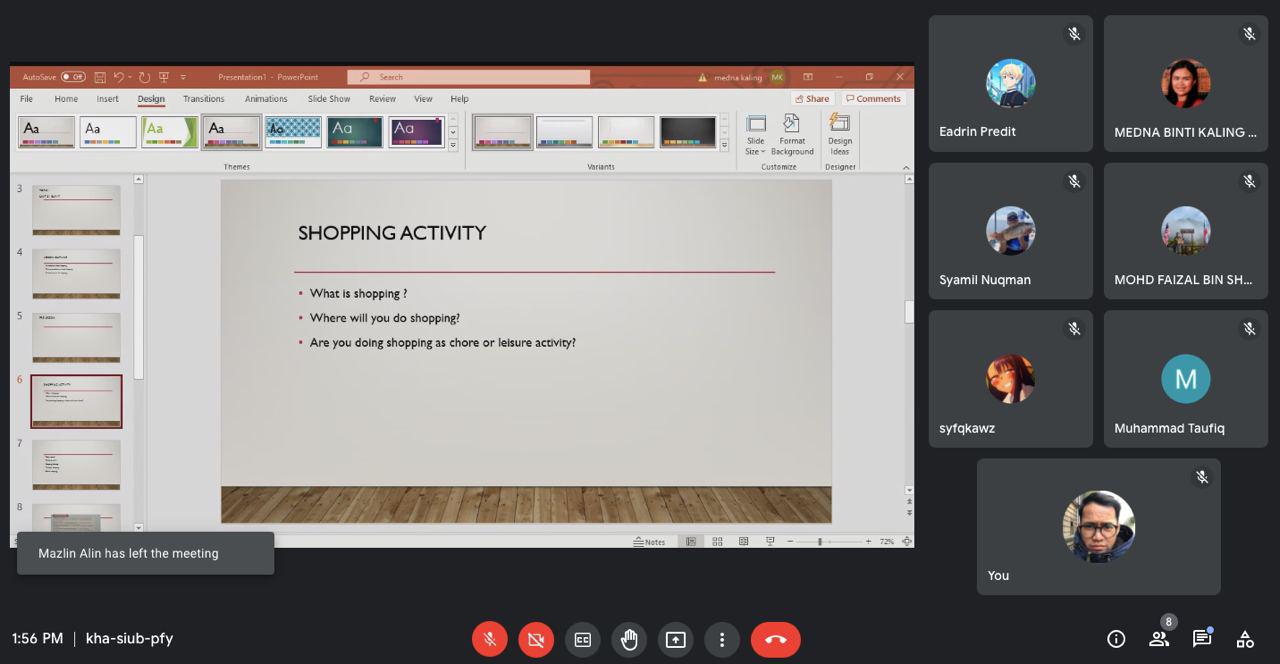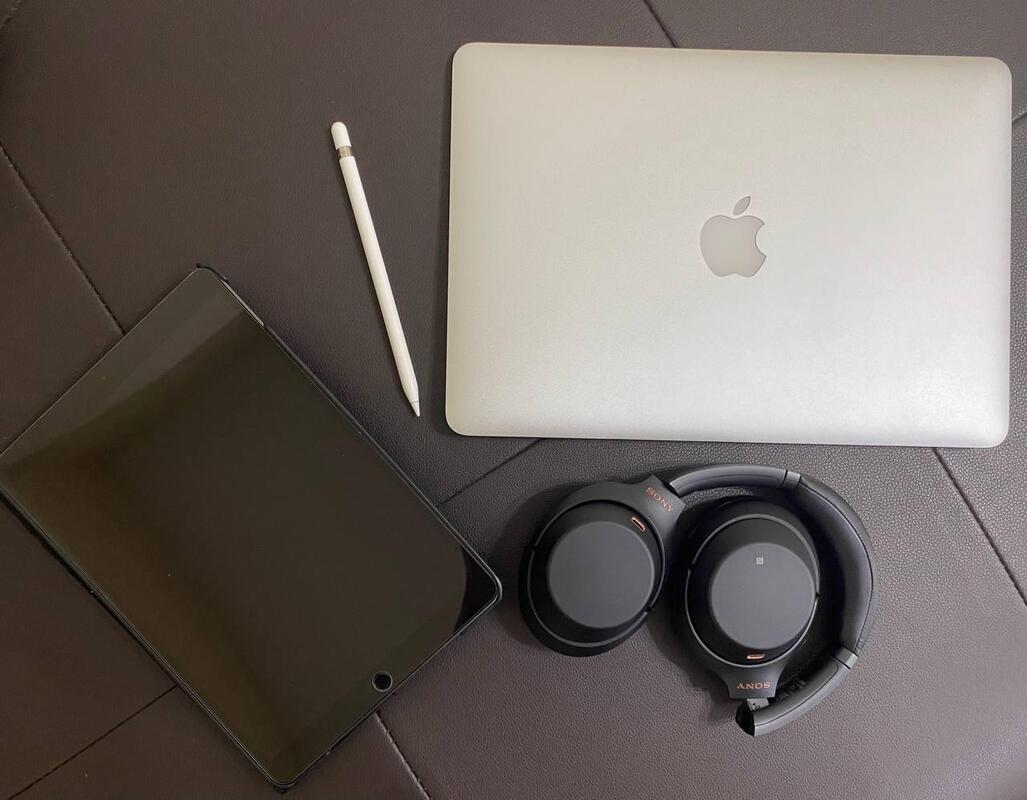|
by Abdul Aziz bin Arsyad Introduction Precisely at 12.01 A.M. on the 4th of April 2021, I decided to pull the plug on my two main social media platforms – Facebook and Instagram after years of online engagement. I woke up the next day with WhatsApp messages from colleagues, family and friends who were asking if I was doing fine and if everything was okay. I reassured them that I was in a sound state of mind and that I just needed a break from the perpetual loop of virtual connectedness. It was not an overnight decision. It was a gradual feeling of exhaustion from the frequent need to be seen online in order to stay active and relevant in today’s world. However, this weariness turned to mental fatigue when the pandemic hit in the first quarter of 2020 and how ever since, teachers and students alike have been ruthlessly inundated with suggestions of innumerable virtual platforms and applications to facilitate online teaching and learning. While I understand the need to fully exploit virtual platforms and cutting-edge applications to ascertain that teaching and learning will continue to take place albeit the persistent pandemic around us, I cannot help but notice that very few of us actually care enough to tell each other to stop and reflect. After more than a year since the pandemic first radically forced the transformation of teaching and learning as we knew it, have we reflected on the reality on the grounds, the well-being of teachers and students as well as what it means moving forward for teachers and their professional development? While I understand the need to fully exploit virtual platforms and cutting-edge applications to ascertain that teaching and learning will continue to take place albeit the persistent pandemic around us, I cannot help but notice that very few of us actually care enough to tell each other to stop and reflect. Reality on the Grounds In our enthusiasm and excitement in implementing everything online, it is imperative for everyone involved in education particularly those helming educational departments to not turn a blind eye to the reality on the grounds. While the pandemic has further highlighted the importance of digitalisation in teaching and learning that is evidently inevitable, it has also exposed another side of the reality – that digital divide is wider than what was previously thought, with the pandemic worsening the prevailing learning disparities as reported by UNICEF in 2020 in an article entitled Education and Covid-19. By now, we all have heard about Veveonah Mosibin who had to climb up a tree just to sit for examinations. Her struggle became instant headline on major local and international platforms but once it turned cold, the media shifted their attention to other things hot. Yet any Bornean knows that her struggle, which is a representation of the daily adversity of many Bornean children, is far from over. Her situation has in fact highlighted deeper and long abandoned issues related to access to connectivity, digital devices, and social inequity. Thus, having a tight grip on the reality on the grounds is important before we continue to demand teachers to push themselves and the students to do more virtually. Understanding their deprivation will then help us see that not all teachers have to be measured the same way in terms of their effectiveness and commitment in conducting lessons in this pandemic era. As we stop this fast-moving train of online classroom and reflect, I suppose what we need to do is to give teachers the trust and autonomy they deserve when it comes to executing lessons that suit the reality they face on daily basis. We have heard stories about teachers who have gone to the extent of making copies of learning materials out of their own pockets and delivering them from door to door. Should not they be celebrated and acknowledged equally for their effort just like those who use Padlet and Wakelet in their lessons? But beyond celebration and acknowledgement, what can we do to help address this digital divide? What sort of pandemic crippling enough for us to realise that even in this new decade, we still have students who have to risk their lives standing on suspension bridge to get better connectivity and get injured in the process? Once we understand this, then perhaps we will be more realistic with our expectations. Each time I sit at the table in front of my Mac that is well connected to stable WiFi from the comfort of my air-conditioned living room, I am reminded of the privilege that I have to conduct lessons online. However, do I get to reprimand the students when they keep getting disconnected as the lesson progresses? Do I get to judge other teachers who are stationed well in the remote parts of Sabah as well as other states who are doing things differently but just as enthusiastically? What right do we have to say that their lessons are less impactful and meaningful just because there is not a single avant-garde application used? And are those teachers less creative for thinking that perhaps they can do away with Zoom and Google Meet and be content enough that their students choose to respond via WhatsApp? Yet we all know too well that at times, even teachers’ instructions on WhatsApp are left with two blue ticks. Allow me to break it to you: it hurts just as badly as when similar disregard is inflicted by your crush when all you expect is a decent reply. In our enthusiasm and excitement in implementing everything online, it is imperative for everyone involved in education particularly those helming educational departments to not turn a blind eye to the reality on the grounds. The Well-Being of Teachers and Students While we applaud teachers who are creative, innovative, and continuously seeking ways of pushing the envelope when it comes to online learning, there is a need for us to be cautious with the idea that more is good. Call me old school but even after all these years, I still am a firm believer in the wisdom of taking everything in moderation. Therefore, as we continue to conduct courses for teachers to expose them to various new, exciting ways of integrating technology into their teaching to improve student engagement and outcome, it is indispensable for us to remind these persevering teachers that it is not about the quantity but quality, as clichéd as it may sound. We know teachers have been doing just about everything within their capability to get the students to learn during this pandemic but lest we forget, mental health is a real issue faced by both students and teachers, as reported by Jonathan Lee Rong Sheng in his article published earlier this year entitled Mental Health Matters. Hence when it comes to teachers, what they need is not just a compliment for their commendable effort in embracing new technology but acknowledgement that they too have family and children to worry about who are equally affected by the pandemic just like everyone else is. Will it not be our obligation then to show a little kindness? Due to the drastic transformation of teaching and learning in this pandemic era, there are more WhatsApp and Telegram groups now with different classes, school admins and parents, causing unintended and undesirable results of time and personal space violation. Teachers wake up with emails and messages from various stakeholders that may lead to stress and anxiety, as stated by Mark Ryan Raj in his article published in March this year, Covid-19: Some Malaysian Educators Face Burnout Due to Demands of Teaching During Pandemic. As if it was not already mentally taxing enough for them to navigate their ways through numerous digital platforms and applications that potentially lead to cognitive load, teachers receive more and more instructions to do even more. Consequently, students are then pressured to do more to provide evidence of their learning, which will then provide evidence of teaching. This drives both teachers and students to work round the clock, even up to late at night and early in the morning. Even as they finally put down their heads to rest, their phones continue to buzz with notifications. Now that we stop and reflect, perhaps it is time to ask ourselves: have we lost our compassion in our obsession with excessive data and documentation? ...as we continue to conduct courses for teachers to expose them to various new, exciting ways of integrating technology into their teaching to improve student engagement and outcome, it is indispensable for us to remind these persevering teachers that it is not about the quantity but quality, as clichéd as it may sound. Getting Rid of the Frills It has been more than a year and we are still in uncertainty. In fact, it is even more uncertain now as compared to when the pandemic first struck, with more variants identified worldwide. Even so, teachers continue to persistently navigate through these unfamiliar territories and are admirably determined to learn, unlearn, and relearn. For everything they have thus far perseveringly endured, they deserve a pat on the back, not an officer who breathes down their neck for evidence of what they have been doing, with the unmistakable undertone of mistrust and suspicion. This erratic pandemic has certainly made us profoundly reflect on various aspects of our profession and what we have also come to realise is that some of the things we have previously done as teachers are nothing but fancy frills that we most certainly can be more productive without. For too long, teachers have expressed concerns over the sheer workload and how we have been bogged down with clerical work in schools. I have come across a witty yet brilliant meme before with a caption that goes “Covid-19 has made us realise that some meetings can be emails”. Frankly, who does not resonate with that? As a schoolteacher myself before, I once struggled juggling between my core business in the classroom and the frills as Jack of all trades. It was well within my knowledge that I had students who needed extra attention and that it was my duty to plan and execute lessons better or engage more in classroom research in order to be a reflective practitioner. Looking back, despite the frills I had to deal with, I rose above these challenges and managed to actively attend and present research papers at national and international conferences. But how many teachers would persevere in such situation? One blessing that has come with the temporary crumbling of school walls due to the ongoing pandemic is that teachers no longer have to worry about school toilets, landscaping and wiring. Now as a lecturer educating future teachers, I constantly remind my practicum students that the challenges of conducting online classes should make them more creative, realistic and reflective. Take the opportunity of not having to worry about clerical work in schools to focus on finding more effective ways of teaching through participation in relevant courses, conferences and classroom reflection and research. Now that there is time to stop and reflect, I have a dream (and I’ll continue to dream against all odds) that when the pandemic is eventually under control and teachers and students once again return to school grounds, teachers will continue to have more space to focus on improving their craft instead of being constantly demoralised by unnecessary frills, a similar sentiment echoed by Song Beng Kah in a letter entitled Teachers Should Be More Professionally Respected written in 2019. I know fellow teachers who want to be engaging in classroom research but are afraid of the extra burden. The irony is that being a reflective practitioner is the duty of every teacher and a natural, organic part of the profession and teacher professional development. But who can blame teachers for perceiving it that way when they have not finished filing reports for broken chairs, wobbly tables, and damaged faucets? Conclusion In a couple of days, it will mark three full months since I decided to pull the plug on my social media platforms. I never thought I would make it this far as the first few days were truly a struggle to cope with withdrawal syndrome. Looking back, there were various factors that eventually drove me to take such a bold decision, but one salient reason was to keep my life in balance. Previously, teaching in the classroom was my source of real-life social engagement while Facebook and Instagram were virtual sanctuary that would provide escapism after a long day at work. Now that teaching has gone online at full throttle, I deem it necessary and healthy to temporarily let go of both spaces to escape the perpetual loop of virtual connectedness. Surprisingly, I have received support from not just fellow teachers but friends who have felt the same way for quite a while but have not mustered enough gallantry to do the same. I now turn to reading, writing – poems, anecdotes – and doodling for some quiet and peace after sitting all day attending virtual meetings and webinars, supervising students and of course, conducting teaching and learning online. I tell myself to draw the line and that I am only human after all. And tell me, when was the last time someone kindly said that to a persevering teacher? Published on 8 July 2021 AuthorAbdul Aziz bin Arsyad has served in the field of ELT and education in general for close to ten years. He graduated from Universiti Teknologi MARA (UiTM) as a KPM Scholar with First Class Honours in B. Ed TESL in 2011. In 2019, he became the recipient of Chevening Scholarship, a prestigious British government scholarship co-funded by Yayasan Khazanah to further his studies in MSc in TESOL at Moray House School of Education and Sport, University of Edinburgh, Scotland, United Kingdom. He graduated with Distinction in 2020. He is currently the Head of Language Studies Department at the Institute of Teacher Education, Tawau Campus. He can be reached at [email protected].
9 Comments
Roslan Mp
7/7/2021 08:43:37 pm
Congrats Mr Aziz. Good Sharing.
Reply
Nat
7/9/2021 01:07:31 am
What an thoughtful article Mr Arsyad. You speak for many teachers and students out there who are suffering from the so called digital divide. The struggle is real. Everytime I make lesson plans, I can't help but thinking what my students are experiencing that oftentimes I adjust the lessons to be more understanding and accommodating. You're inspiring!
Reply
Miss L
7/7/2021 09:15:24 pm
Something we have to look and be alert towards what happen nowadays it's really influenced our daily life especially towards young generations..
Reply
Shafie Hassan
7/8/2021 08:57:09 am
Good sharing Mr. Abdul Aziz
Reply
Alif
12/13/2021 06:42:44 pm
Nice
Reply
Martyn
7/8/2021 10:27:37 pm
We chased to meet the so desired social standard portrayed on social media platforms by friends and celebs where we begin to lose our true self. On social media platforms, we're always presented with the pictured perfect lifes from people we follow and in most cases we tend to get so influenced by it. Always bear in mind that people only show you what they want you to see. We are humans regardless and we have our ups and downs, and social media platform has made it possible for everyone to present their possitive sides only so dont be discourage :) Great sharing sir!!
Reply
Idham Dylan
7/9/2021 06:21:17 am
A really great perspective and view from a teacher. I really agree to what the article says as it is hard for teachers to go throught this situation during pandamic. Communicating by social messaging apps like whatsapp is definitely not ideal as it is hard to give the full picture of any form of communication like problems and ideas etc. Overall, i agree that Teachers deserve a pat in the back for their hardwork and adaption to virtual learning!
Reply
Connie Maskilone
7/9/2021 08:04:38 pm
Reply
7/11/2021 07:05:35 pm
Reading an article like this, written by you some more makes it feels closer and meaningful. I always believe the best thoughts and view to listen to is from those who have been there done that and now in a better position to make a move and start the positive change in the system. Thank you for being the voice of voiceless teachers. Keep up the great work and keep inspiring. You are the living proof that nothing is impossible if you believe in yourself! This article is just one of the millions more fruitful journey to come for you and us all. Great article!
Reply
Leave a Reply. |
Categories
All
|



